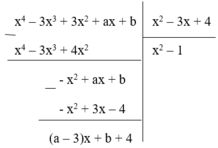Cho : f(x) = x4+x3-3x2 + ax + b
g(x) = x2-3x+2. Tìm a và b để f(x) chia hết g(x)
mình cần gấpppppppppppppppppppppp, giúp với ạ
Bài 3. Tìm giá trị của a, b để đa thức f(x) chia hết cho đa thức g(x) với
f(x) = x4− 3x3+ 3x2+ ax + b; g(x) = x2− 3x + 4.
\(f\left(x\right)⋮g\left(x\right)\)
\(\Leftrightarrow x^4-3x^3+4x^2-x^2+3x-4+\left(a-3\right)x+\left(b+4\right)⋮x^2-3x+4\)
\(\Leftrightarrow\left(a,b\right)=\left(3;-4\right)\)
Cho đa thức f(x) = x 4 – 3 x 3 + 3 x 2 + ax + b và đa thức g(x) = x 2 – 3x + 4. Biết f(x) chia hết cho g(x). Khi đó tích a.b bằng
A. -12
B. 12
C. -6
D. -8
Ta có

Phần dư của phép chia f(x) cho g(x) là R = (a – 3)x + b + 4. Để phép chia trên là phép chia hết thì R = 0, Ɐx
ó (a – 3)x + b + 4 = 0, Ɐx ó a - 3 = 0 b + 4 = 0
ó a = 3 b = - 4 => ab = -12
Đáp án cần chọn là: A
Tìm a và b để đa thức f(x) = x 4 – 9 x 3 + 21 x 2 + ax + b chia hết cho đa thức g(x) = x 2 – x – 2
A. a = -1; b = 30
B. a = 1; b = 30
C. a = -1; b =-30
D. a = 1; b = -30
Ta có

Phần dư của phép chia f(x) cho g(x) là R = (a – 1)x + b + 30
Để phép chia trên là phép chia hết thì R = 0 với mọi x
ó (a – 1)x + b + 30 = 0 với mọi x
ó a - 1 = 0 b + 30 = 0 ó a = 1 b = - 30
Vậy a = 1; b = -30
Đáp án cần chọn là: D
Cho các đa thức f(x) = x5 – 3x2 + x3 – x2 - 2x + 5
g(x) = x5 – x4 + x2 - 3x + x2 + 1
a) Thu gọn và sắp xếp đa thức f(x) và g(x) theo luỹ thừa giảm dần.
b)Tính h(x) = f(x) + g(x)
a: \(F\left(x\right)=x^5-3x^2+x^3-x^2-2x+5\)
\(=x^5+x^3-4x^2-2x+5\)
\(G\left(x\right)=x^5-x^4+x^2-3x+x^2+1\)
\(=x^5-x^4+2x^2-3x+1\)
b: Ta có: \(H\left(x\right)=F\left(x\right)+G\left(x\right)\)
\(=x^5+x^3-4x^2-2x+5+x^5-x^4+2x^2-3x+1\)
\(=2x^5-x^4+x^3-2x^2-5x+6\)
Cho đa thức: f(x)=x4-3x2+2x-7 và g(x)=x+2
a) Thực hiện phép chia f(x) : g(x)
b) Tìm số nguyên x để f(x) chia hết cho g(x)
c) Tìm m để đa thức k(X)= -2x3+x-m chia hết cho g(x)
Lời giải:
a. $f(x)=x^4-3x^2+2x-7=x^3(x+2)-2x^2(x+2)+x(x+2)-7$
$=(x+2)(x^3-2x^2+x)-7=g(x)(x^3-2x^2+x)-7$
Vậy $f(x)$ chia $g(x)$ được thương là $x^3-2x^2+x$ và dư là $-7$
b. Theo phần a $f(x)=(x^3-2x^2+x)g(x)-7$
Với $x$ nguyên, để $f(x)\vdots g(x)$ thì $7\vdots g(x)$
$\Leftrightarrow x+2$ là ước của $7$
$\Rightarrow x+2\in\left\{\pm 1;\pm 7\right\}$
$\Leftrightarrow x\in\left\{-3; -1; 5; -9\right\}$
c.
Theo định lý Bezout về phép chia đa thức, để $K(x)=-2x^3+x-m\vdots x+2$ thì: $K(-2)=0$
$\Leftrightarrow -2(-2)^3+(-2)-m=0$
$\Leftrightarrow 14-m=0$
$\Leftrightarrow m=14$
Tính f(x) + g(x) với:
f(x) = x5 – 3x2 + x3 – x2 – 2x + 5
g(x) = x2 – 3x + 1 + x2 – x4 + x5
Thu gọn, sắp xếp đa thức theo lũy thừa giảm của biến:
* Ta có: f(x) = x5 – 3x2 + x3 – x2 – 2x + 5
= x5 – (3x2 + x2 ) + x3 - 2x + 5
= x5 – 4x2 + x3 – 2x + 5
= x5 + x3 – 4x2 – 2x + 5
Và g(x) = x2 – 3x + 1 + x2 – x4 + x5
= (x2 + x2 ) – 3x + 1 – x4 + x5
= 2x2 – 3x + 1 – x4 + x5
= x5 – x4 + 2x2 – 3x + 1
* f(x) + g(x):

Cho đa thức
F(x)=x5 - 3x2 -x3 - x2 - 2x + 5
G(x)+x5 - x4 + x2 - 3x + x2 + 1
Tính H(x) = F(x) + G(x)
\(H\left(x\right)=F\left(x\right)+G\left(x\right)=\left(x^5-3x^2-x^3-x^2-2x+5\right)+\left(x^5-x^4+x^2-3x+x^2+1\right)\\ =x^5-3x^2-x^3-x^2-2x+5+x^5-x^4+x^2-3x+x^2+1\\ =\left(x^5+x^5\right)-x^4-x^3-\left(3x^2+x^2-x^2-x^2\right)-\left(2x+3x\right)+5\\ =2x^5-x^4-x^3-2x^2-5x+5\)
câu hỏi : tìm x nguyên để đa thức f(x) chia hết cho đa thức g(x).
a,f(x) = 2x2-x+2 ; g(x) = x+1
b,f(x) = 3x2-4x+6 ; g(x) = 3x-1
c,f(x) = -2x3-7x2-5x+5 ; g(x) = x+2
d,f(x) = x3-3x2-4x+3 ; g(x) = x+1
a)\(f\left(x\right)=2x^2-x-3+5=\left(x+1\right)\left(2x-3\right)+5\)
Để \(f\left(x\right)⋮g\left(x\right)\Leftrightarrow\left(x+1\right)\left(2x-3\right)+5⋮\left(x+1\right)\)
\(\Leftrightarrow5⋮\left(x+1\right)\)
mà \(x+1\in Z\Rightarrow x+1\in U\left(5\right)=\left\{-1;1;5;-5\right\}\)
\(\Leftrightarrow x\in\left\{-2;0;4;-6\right\}\)
Vậy...
b) \(f\left(x\right)=3x^2-4x+6=\left(3x^2-4x+1\right)+5=\left(3x-1\right)\left(x-1\right)+5\)
Để \(f\left(x\right)⋮g\left(x\right)\Leftrightarrow\left(3x-1\right)\left(x-1\right)+5⋮\left(3x-1\right)\)
\(\Leftrightarrow5⋮\left(3x-1\right)\) mà \(3x-1\in Z\Rightarrow3x-1\in U\left(5\right)=\left\{-1;1;5;-5\right\}\)
\(\Leftrightarrow x\in\left\{0;\dfrac{2}{3};2;-\dfrac{4}{3}\right\}\) mà x nguyên\(\Rightarrow x\in\left\{0;2\right\}\)
Vậy...
c)\(f\left(x\right)=\left(-2x^3-7x^2-5x+2\right)+3\)\(=\left(-2x^3-4x^2-3x^2-6x+x+2\right)+3\)\(=\left[-2x^2\left(x+2\right)-3x\left(x+2\right)+\left(x+2\right)\right]+3\)
\(=\left(x+2\right)\left(-2x^2-3x+1\right)+3\)
Làm tương tự như trên \(\Rightarrow x+2\inƯ\left(3\right)=\left\{-3;-1;1;3\right\}\)
\(\Leftrightarrow x\in\left\{-5;-3;-1;1\right\}\)
Vậy...
d)\(f\left(x\right)=x^3-3x^2-4x+3=x\left(x^2-3x-4\right)+3=x\left(x+1\right)\left(x-4\right)+3\)
Làm tương tự như trên \(\Rightarrow x+1\inƯ\left(3\right)=\left\{-3;-1;1;3\right\}\)
\(\Rightarrow x\in\left\{-4;-2;0;2\right\}\)
Vậy...
Cho các đa thức:
f(x) = x4 – 3x2 + x – 1
g(x) = x4 – x3 + x2 + 5
Tìm h(x) biết f(x) + h(x) = g(x)
Ta có: f(x) + h(x) = g(x)
Suy ra: h(x) = g(x) – f(x) = (x4 – x3 + x2 + 5) – (x4 – 3x2 + x – 1)
= x4 – x3 + x2 + 5 – x4 + 3x2 – x + 1
= ( x4 – x4) – x3 + (x2 + 3x2 ) – x + (5+ 1)
= -x3 + 4x2 – x + 6
Cho các đa thức:
f(x) = x4 – 3x2 + x – 1
g(x) = x4 – x3 + x2 + 5
Tìm h(x) biết f(x) – h(x) = g(x)
Ta có: f(x) – h(x) = g(x)
Suy ra: h(x) = f(x) – g(x) = (x4 – 3x2 + x – 1) – (x4 – x3 + x2 + 5)
= x4 – 3x2 + x – 1 – x4 + x3 – x2 – 5
= (x4 – x4) + x3 – (3x2 + x2) + x - (1+ 5)
= x3 – 4x2 + x – 6